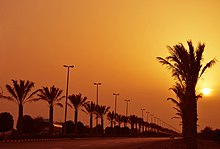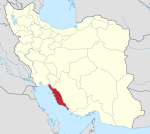Bushehr province
Bushehr Province
استان بوشهر | |
|---|---|
 Map of Bushehr Province | |
 Location of Bushehr within Iran | |
| Country | |
| Region | Region 2 [1] |
| Capital | Bushehr |
| Counties | 10 |
| Area | |
• Total | 22,743 km2 (8,781 sq mi) |
| Population (2011)[2] | |
• Total | 1,032,949 |
| • Density | 45/km2 (120/sq mi) |
| Time zone | UTC+03:30 (IRST) |
| • Summer (DST) | UTC+04:30 (IRST) |
| Main language(s) | Persian, Lurish |
Bushehr Province (Template:Lang-fa, Ostān-e Būshehr ) is one of the 31 provinces of Iran. It is in the south of the country, with a long coastline onto the Persian Gulf. Its center is Bandar-e-Bushehr, the provincial capital. The province has nine counties: Asaluyeh, Bushehr, Dashtestan, Dashti, Dayyer, Deylam, Jam, Kangan, Ganaveh and Tangestan. In 2011, the province had a population of approximately 1 million people.
The province was put as part of Region 2 upon the division of the provinces into 5 regions solely for coordination and development purposes on June 22nd, 2014.[1]
History
The Greeks knew of Bushehr by Mezambria during the battles of Nearchus. A French excavating team however in 1913 determined the origin of Bushehr to date back to the Elamite Empire. A city there, known as Lyan, contained a temple that was designed to protect the compound from naval attacks. Its remains can still be seen today 10 kilometers south of the present city of Bushehr.
Marco Polo describes this region as part of the Persian province of Shabankareh. It contains the village of Saba, Iran where are buried (he was told) the three Magi which visited the Christ Child.[3]
A key turning point in the history of Bor event of significance is known to have taken place in this region until the arrival of the European colonialists in the 16th century.
The Portuguese, invaded the city of Bushehr in 1506 and remained there until Shah Abbas Safavi defeated and liberated the Persian Gulf region of their presence. By 1734, Bushehr had once again risen to prominence due to Nader Shah of the Afsharid dynasty, and his military policies in The Persian Gulf.
Bushehr was selected by Nader to be the central base of Nader's Naval fleet in the Persian Gulf. He thus changed the name of the city to Bandar e Naderiyeh (Nader's Port). He hired an Englishman by the name of John Elton to help build his fleet. Dutch accounts report his naval fleet to have amounted to 8000-10000 personnel as well as several ship construction installations.
After Nader's death, the Dutch continued to have good commercial relations in Bushehr, until the British made their debut in Bushehr in 1763 by a contract they signed with Karim Khan of the Zand dynasty. By then, the city of Bushehr had become Iran's major port city in the Persian Gulf. By the Qajar era, Britain, Norway, Russia, Italy, France, Germany, and the Ottomans had diplomatic and commercial offices there, with Britain steadily gaining a foothold in the area. Close to 100 British ships are reported to have docked at the port city every year during the Qajar era.
Administrative divisions
Bushehr Province:
Bushehr today

Aside from the revived port city of Bushehr, which is the second main naval port of Iran after Bandar Abbas, Bushehr also has come back recently in the spotlight for three main reasons:
Kharg Island (Khark Island)
During the Iran-Iraq war, Iran's major petroleum exporting ports in Khuzestan sustained damages so severe that a second port in Kharg Island was selected to carry on the major responsibility of Iran's petroleum exports, though even Kharg was not immune from Iraqi air raids.
Bushehr Nuclear Reactor
The Bushehr Light water PWR Nuclear Reactor, designed by Siemens AG, built by the Russians, is Iran's first Nuclear Power Plant reactor.
The industrial corridor of Assalouyeh
As many as 70,000 foreign engineers and technicians are currently working in this industrial zone 270 kilometers south of the provincial capital. This zone is where the nearby famous South Pars Gas field is located, where Iran has invested hundreds of millions of dollars in infrastructure. The South Pars Gas field is the world's largest natural gas field.
The Assalouyeh industrial zone is deemed so lucrative that even American companies such as American Allied International Corp and Halliburton have bypassed American sanctions to become somehow involved in the zone.[1]
Colleges and universities
- Persian Gulf University
- Bushehr University of Medical Sciences
- Islamic Azad University of Bushehr
- Islamic Azad University of Borazjan
- Islamic Azad University of Shabankare
- Islamic Azad University of Khormuj
- Islamic Azad University of Khark
- Iran Nuclear Energy College
- Payame Noor University of Bushehr
Sports
Football is the most popular sports in Boushehr. Boushehr is home to a famous football team: Shahin-e Boushehr (Pars-e Jonoubi).
Shahin is one of the oldest soccer team in Iran which has found in 1942. Shahin is one of the most popular teams in current Iranian football league just like Tractor-Sazi from Tabriz.
Some attractions of Bushehr

Despite its unique potentials, Bushehr remains to be developed for absorbing tourists and seriously lacks the necessary investment for tourism. The city of Bushehr has 3-star hotels, an airport, and modern amenities. The Cultural heritage Organization of Iran lists up to 45 sites of historical and cultural significance in the province. Some are listed below:
- Persian Gulf Beach(Bushehr)
- Deje Borazjan
- Kakhe tauke (borazjan)
- Shahzade Ebrahim (Shazabreim)
- Qal'eh Holandiha (The Dutch Castle)
- Mabad Poseidon, (Poseidon's temple)
- Gurestan Bastani (the ancient cemetery)
- Imamzadeh Mir Mohammed Hanifeh
- Aramgah (tomb of) Haj Mohammed Ibrahim Esfahani
- The Old Church of Kharg Island
- Qavam water reservoir
- Qazi House
- Maqbareh (tomb of) the English General
- Shaykh Sadoon Mosque
- The Holy Christ Church
- House of Raies Ali Delvari
- House of Malik
- The ancient site of Ray-Shahr which is located 8 km south of Bushehr.
- Tomb of Abdul mohaymrn
- House Darya Baygui
- House of Dehdashti
- Castle of Khormuj
Literature
Bushehr has been home to some famous poets. Among them are Faiez Dashti (Dashtestani) (1830-1919) and Manouchehr Atashi. Faiez poems, and dashti(or dashtestani) literature in general, resemble Baba Taher's works. Sadeq Chubak and Najaf Daryabandari are among the most prominent writers in literature of Bushehr.
A strong earthquake measuring 6.1 on the Richter scale struck the town of Shonbeh and villages of Shonbeh and Tasuj District in Dashti County of Bushehr Province on 9 April 2013, killing at least 37 people. [4]
References
- ^ a b همشهری آنلاین-استانهای کشور به ۵ منطقه تقسیم شدند
- ^ "Archived copy". Archived from the original on 2013-07-19. Retrieved 2013-07-26.
{{cite web}}: Unknown parameter|deadurl=ignored (|url-status=suggested) (help)CS1 maint: archived copy as title (link) - ^ Template:The Travels of Marco Polo
- ^ Iran quake kills 37, injures more than 850
External links
- Bushehr Cultural Heritage Organization
- Iran Oil Terminals Company
- Iran Petrochemical Commercial Company
- Pars Special Economic Energy Zone
- National Iranian Gas Company
- National Petrochemical Company of Iran
- Bushehr Province Department of Education (in Persian)
- Official website of Shahin Club (in Persian)
- Iranian textbooks On Bushehr province (in Persian)

